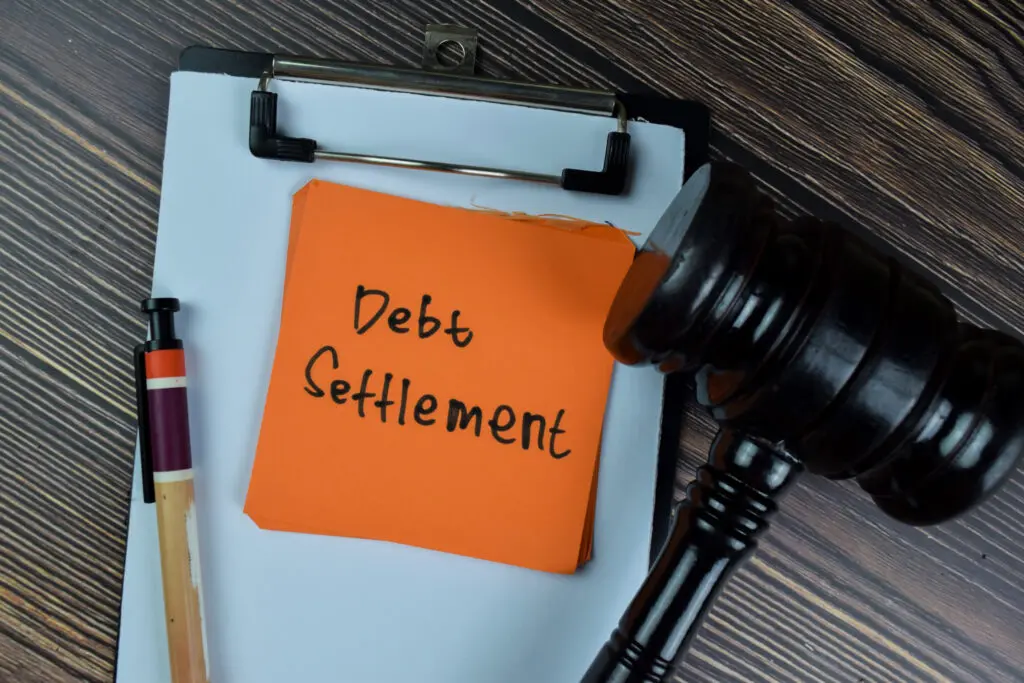Debt settlement: Will it work for me?
In a Nutshell
Debt settlement is a process that allows you to pay a monthly lump sum that is usually less than the amount you owe to resolve, or "settle," your debt. It is a service often provided by third-party companies that claim to reduce your debt by negotiating a settlement with your creditor. Paying off a debt for less than you owe may sound great at first, but debt settlement can be risky, as it can affect your credit score or even cost you more money.
Editorial Note: Going into debt is easy. Getting out is hard but it does not have to be. Our credit repair team is ready to help you achieve the success you want in your life. We offer 3 tiers to our credit repair plan: credit Repair, Debt Management, and Legal.
Debt settlement is a service offered by third-party firms that are trying to reduce your debt by negotiating settlements with your creditors or debt collectors. But there are risks.
While it may be very tempting to turn to a debt settlement service to lower your debts, it's important to keep in mind that you could end up deeper in debt or with a detrimental impact on your credit.
Here's some key information you should know about how debt settlement works, its advantages and disadvantages, and how it could affect your credit.
- How debt settlement works
- Debt settlement: Benefits and risks
- Our picks for debt settlement
- Alternatives to debt settlement
- Next steps if you want to go ahead with debt settlement
How debt settlement works
Debt settlement firms may also be known as "debt relief" or "debt adjustment" companies. Usually, these companies offer to contact your creditors on your behalf, to negotiate a better payment plan or to settle or reduce your debt. They generally charge a fee, often a percentage of the total amount that would be saved on the settled debt.
Learn more about What Is Debt Consolidation and how it works.
The corporation may attempt to negotiate with your creditor for a lump sum payment that is less than the amount you owe. While negotiations are taking place, they may require you to make regular deposits into an account that is under your control but managed by an external third party. You use this account to save money for that lump sum payment.
While negotiating, the debt settlement company may also advise you to stop paying your creditors until a debt settlement agreement is reached.
Once the debt settlement firm and your creditors reach an agreement - at a minimum, changing the terms of at least one of your debts - you must accept the agreement and make at least one payment to the creditor or debt collector for the settled amount. And then the debt settlement agency can begin charging you a fee for its services.
Be aware that there is no guarantee that the company will be able to reach a debt settlement agreement for all of your debts.
How to Find Legal Help When You Can’t Afford a Lawyer when you’re struggling financially.
Debt settlement: Benefits and risks
Debt settlement may have some advantages, but you should also carefully consider the potential risks of debt settlement.
The benefits
Settling a debt through a debt settlement firm could …
- Lower your debt amount.
- Help you avoid bankruptcy.
- Get creditors and collectors off your back.
The risks
But the costs may exceed the benefits.
- Your creditors may not agree to negotiate
Not only is there no guarantee that the debt settlement firm will be capable of successfully liquidating all of your debts, but some creditors do not deal with debt settlement firms at all.
- You could end up with more debt
If you fail to pay a debt, you may end up paying late fees or interest. You could even face collection efforts or a lawsuit filed by a creditor or debt collector. In addition, if the company successfully negotiates a debt settlement, the portion of the debt forgiven could be considered taxable income on your federal taxes, which means you may have to pay taxes on it.
- You may be charged fees, even if your whole debt isn’t settled
Debt settlement companies can’t collect a fee until they’ve reached a settlement agreement, you’ve agreed to the settlement, and you’ve made at least one payment to the creditor or debt collector as a result of the agreement. But you could still end up paying a portion of the debt settlement company’s full fees on the rest of your unsettled debts, says Bruce McClary, senior vice president of communications at the National Federation for Credit Counseling.
“If you have five or six creditors and the company settles one of those debts, they can start charging a fee as soon as they receive a result,” McClary says.
And if a debt relief firm settled a " percentage" of your total debt enrolled in their plan, they can charge you that same amount as a percentage of your total fee. For example, if your total debts amount to $10,000, and a debt relief corporation settles $5,000 of the total amount, you are allowed to charge 50% of the total fee agreed upon.
- It could negatively impact your credit
A debt settlement firm may be encouraging you to stop paying your debts while you save money for a lump sum payment. But at this point, your creditors may not have agreed to anything, which might mean that all those payments you miss may end up as delinquent accounts on your credit reports.
Your credit ratings could be affected as a result of the missed payments, and the creditor could also send your account to collections or sue you for the debt.
Debt happens for many reasons. Learn 12 Easy Ways to Pay off Debt.
Our picks for debt settlement
We don't recommend debt settlement as a primary option because of the risks associated with it. But if you're looking for debt settlement suppliers, some might be better than others for your situation. Our selections have a track record of helping clients successfully settle their debts while remaining flexible to their own needs.
CPG Credit Repair Plan
Why Consumer Protection Group stands out: CPG has a credit repair plan for everyone. You can join the millions who become debt-free.
The company offers a free "no risk" consultation to help you decide if their program could work for you.
- Credit Plan — Offer Full Customer Service. To better understand each client's needs. You are required to schedule an initial 15-20 minute call with follow-up calls, based on the initial call outcome. It is very important not to miss the scheduled calls to keep yourself on track and accomplish your desired outcome.
- Debt Plan — You do not have to take the burden of debt on by yourself. Many proactive measures can be taken to ease the struggle and get things on the right track. Let our team do all the worrying and work so you can focus on what is best for you.
- Legal Plan — Discounted legal services provided by a nationwide referral service of over 20,000 attorneys with an average of 19.5 years of experience. Unlimited phone consultations, face-to-face consultations, review of Legal Documents (6 pages or less), letters written on member’s behalf when deemed appropriate by the attorney, phone calls made on member’s behalf, assistance in solving problems with governmental programs, assistance with small claim court representation, and much more.
Resolve
Why Resolve stands out: Resolve is a debt management service that provides users with features such as debt settlement and negotiation as well as budgeting tools and credit score monitoring.
- Flexible debt resolution — Resolve says it can contact creditors on your behalf to negotiate solutions to your debt, and that any solution Resolve offers you is optional.
- Fees — Resolve charges a monthly fee (about $17) to use its services. If you decide to start a debt management plan, the service will match you with a credit counselor in its network. Although Resolve itself doesn’t charge a fee for each debt settlement provider you use, the providers it works with do. Your fees will vary depending on which of Resolve’s partners you work with.
- Tools to track your finances — Resolve offers customers credit monitoring and budgeting tools to help manage to spend, so you may find the app useful even after your debt has been settled.
Alternatives to debt settlement
- Negotiate your settlement
Try negotiating settlements with credit card companies or other creditors on your own. Offer an amount that you can pay immediately, even if it’s less than what you owe.
- Transfer balances
If you have credit card debt, consider a balance transfer. A balance transfer involves moving debt from one credit card to another, usually to take advantage of an introductory 0% interest offer on the new card.
Balance transfer cards usually have one of these 0% introductory interest offers for a set period of time and may charge a flat fee or a percentage of the amount being transferred.
To find out if a balance transfer is a good idea for you, check to see if you will pay more money in interest on your current card than the cost of the balance transfer fees. And you should also try to pay off the balance before the card's promotional period expires to avoid paying interest on your balance.
- Seek nonprofit credit counseling
Nonprofit organizations may provide credit counseling services that offer free or low-cost advice on budgeting and debt management. Credit counseling agencies do not usually offer to negotiate to reduce debt. But a credit counselor can work with creditors on payment plans or stop late fees or efforts such as collection calls.
Next steps if you want to go ahead with debt settlement
Do your research. The Federal Trade Commission helps protect consumers by trying to prevent unfair business practices in the marketplace. The FTC has useful information on debt settlement that’s worth reading as you consider debt settlement options.
Pick a reputable debt settlement service provider. Before you enroll in any debt settlement program, the Consumer Financial Protection Bureau recommends contacting your state attorney general and local consumer protection agency to check whether there are any complaints on file. The state attorney general’s office can also check if the company is required to be licensed and whether it meets your state’s requirements.
The Better Business Bureau has consumer reviews of businesses that could help you as you research a debt settlement service provider.












